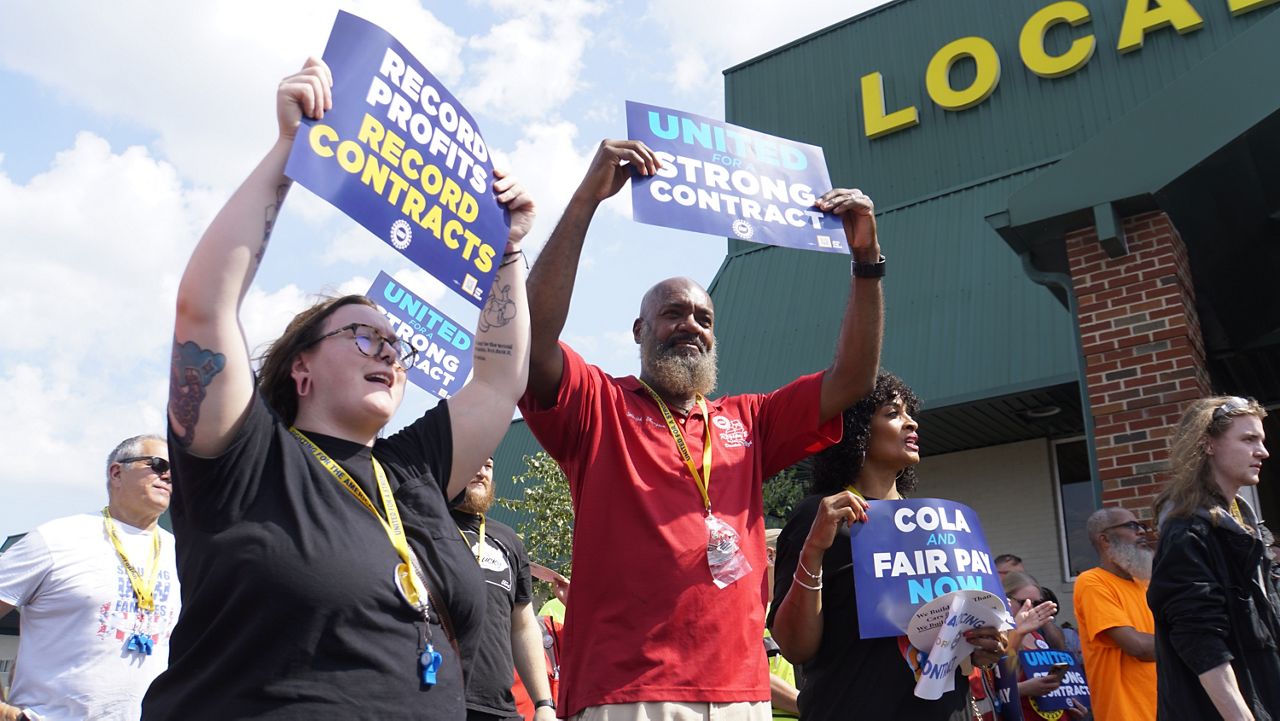KENTUCKY — United Auto Workers union members from a Kentucky Ford truck plant announced Wednesday they are joining the Stand Up Strike against Detroit Three automakers. UAW said there are 8,700 UAW members who work there.
Local 862 workers started walking off the job in Louisville Wednesday at 6:30 p.m. The plant makes profitable heavy-duty F-Series pickup trucks and large SUVs.
President Shawn Fain and Vice President Browning called on Kentucky members to strike directly after Ford refused to make progress in bargaining.
— UAW (@UAW) October 11, 2023
“It’s time for a fair contract at Ford and the rest of the Big Three. If they can’t understand that after four weeks, the 8,700 workers shutting down this extremely profitable plant will help them understand it," Shawn Fain, UAW's president, said.
He said in a statement that the union has waited long enough “but Ford hasn’t gotten the message” to bargain for a fair contract.
Local 862 is shutting it down at Ford's Kentucky Truck Plant! Workers have now walked off the job and are joining the Stand Up Strike!#StandUpUAW pic.twitter.com/NVqlbunZMH
— UAW (@UAW) October 11, 2023
"I stand with our UAW brothers & sisters on strike," U.S. Rep. Morgan McGarvey, D-Ky., wrote on X, formerly known as Twitter. "Local 862 is responsible for 54% of Ford’s North American profits, & their workers deserve a fair contract, good benefits & wages, & safe working conditions."
Ford released the following statement in response to the Kentucky workers joining the strike:
"The decision by the UAW to call a strike at Ford’s Kentucky Truck Plant is grossly irresponsible but unsurprising given the union leadership’s stated strategy of keeping the Detroit 3 wounded for months through “reputational damage” and “industrial chaos.”
Ford made an outstanding offer that would make a meaningful positive difference in the quality of life for our 57,000 UAW-represented workers, who are already among the best compensated hourly manufacturing workers anywhere in the world. In addition to our offer on pay and benefits, Ford has been bargaining in good faith this week on joint venture battery plants, which are slated to begin production in the coming year.
The UAW leadership’s decision to reject this record contract offer – which the UAW has publicly described as the best offer on the table – and strike Kentucky Truck Plant, carries serious consequences for our workforce, suppliers, dealers and commercial customers.
Kentucky Truck is Ford’s largest plant and one of the largest auto factories in America and the world. The vehicles produced at the Louisville-based factory – the F-Series Super Duty, the Ford Expedition and the Lincoln Navigator – generate $25 billion a year in revenue. In addition to affecting approximately 9,000 direct employees at the plant, this work stoppage will generate painful aftershocks – including putting at risk approximately a dozen additional Ford operations and many more supplier operations that together employ well over 100,000 people.
This decision by the UAW is all the more wrongheaded given that Ford is the only automaker to add UAW jobs since the Great Recession and assemble all of its full-size trucks in America."
The UAW began striking against General Motors, Ford and Stellantis on Sept. 15, with one assembly plant from each company. The next week, the union expanded the strike to 38 GM and Stellantis parts warehouses. Assembly plants from Ford and GM were added the week after that. All told, about 25,000 workers have walked off their jobs at the three automakers.
Thus far, the union has decided to target a small number of plants from each company rather than have all 146,000 UAW members at the automakers go on strike at the same time.
Last week, the union reported progress in the talks and decided not to add any more plants. This came after GM agreed to bring joint-venture electric vehicle battery factories into the national master contract, almost assuring that the plants will be unionized.
Battery plants are a major point of contention in the negotiations. The UAW wants those plants to be unionized to assure jobs and top wages for workers who will be displaced by the industry’s ongoing transition to electric vehicles.
Since the start of the strike, the three Detroit automakers have laid off roughly 4,800 workers at factories that are not among the plants that have been hit by the UAW strikes.
The companies say the strikes have forced them to impose those layoffs. They note that the job cuts have occurred mainly at factories that make parts for assembly plants that were closed by strikes. In one case, layoffs have been imposed at a factory that uses supplies from a parts factory on strike.
The UAW rejects that argument. It contends that the layoffs are unjustified and were imposed as part of the companies' pressure campaign to persuade UAW members to accept less favorable terms in negotiations with automakers. The factories that have been affected by layoffs are in six states: Michigan, Ohio, Illinois, Kansas, Indiana and New York.
Sam Fiorani, an analyst with AutoForecast Solutions, a consulting firm, said he thinks the layoffs reflect a simple reality: The automakers are losing money because of the strikes. By slowing or idling factories that are running below their capacities because of strike-related parts shortages, Fiorani said, the companies can mitigate further losses.
“It doesn’t make sense to keep running at 30% or 40% of capacity when it normally runs at 100%,” he said. “We’re not looking at huge numbers of workers relative to the ones actually being struck. But there is fallout.”
In a statement, Bryce Currie, vice president of Americas manufacturing at Ford, said: “While we are doing what we can to avoid layoffs, we have no choice but to reduce production of parts that would be destined for a plant that is on strike."
Fain countered in a statement that the automakers were using layoffs to pressure the union into settling the strike. With billions in profits, Fain argued, the companies don’t have to lay off a single employee.
Striking workers are receiving $500 a week from the union’s strike pay fund. By contrast, anyone who is laid off would qualify for state unemployment aid, which, depending on a variety of circumstances, could be less or more than $500 a week.
“Their plan won’t work,” Fain said. “The UAW will make sure any worker laid off in the Big Three’s latest attack will not go without an income.”
Fiorani said that if the strike widens, more workers will likely be laid off at non-striking plants. Once metal stamping factories that supply multiple assembly plants have produced enough parts for non-striking facilities, the companies would likely shut them down.
“Once you've filled up the stocks for the other plants you supply," he said, “you have to lay off the workers and wait out the strike.”
Separate companies that manufacture parts for the automakers are likely to have laid off workers but might not report them publicly, said Patrick Anderson, CEO of the Anderson Economic Group in Lansing, Michigan.
A survey of parts supply companies by a trade association called MEMA Original Equipment Suppliers found that 30% of members have laid off workers and that more than 60% expect to start layoffs in mid-October.
Fiorani said that while larger parts suppliers can likely withstand the strike, smaller companies that make parts for the bigger companies might not have enough cash or the ability to borrow to outlast the job actions. Some, he said, may have a couple dozen workers “and don't have billions in value to use as collateral in loans,” he said.
This story is developing. Check back for updates.
Aly Prouty - Digital Media Producer
Aly Prouty is a digital producer for Spectrum News 1 Wisconsin, Ohio and Kentucky. An award-winning, multimedia journalist, she holds an honors B.A. in journalism from Marquette University and an M.A. in journalism and media studies from The University of Alabama.









